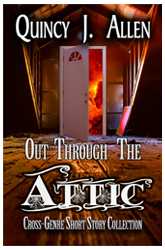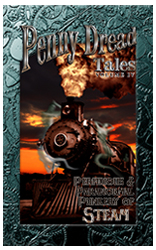It’s always been easy for me to write, especially with the advent of the computer and keyboard. It’s safe to say that writing was what got me through college and even added to the reasons why my IT employers kept me around over the years. I can’t think of a job I had over the past twenty-five years that didn’t involve writing of some kind, whether it was technical specifications, user guides, or policies and procedures for the departments I was involved with.
However, there’s a difference between writing as a facet of your job and turning your writing into a career. That’s an entirely different kettle of fish. I’ve mentioned it before, but part of what kept me from pursuing writing as a career when I was twenty had to do with being convinced by someone else that I didn’t want to be a starving artist the rest of my life. There’s more to it, though. There is, in fact, a litany of reasons why part time and hobbyist writers don’t undertake the challenge of becoming a full-time writer. If that litany of reasons has a name, then that name is fear.
There is certainly the fear of not earning enough to pay the bills. The bigger fear, however, is the fear of actually making it: of putting your words out there for all the word to read. Writing is not unlike streaking, albeit in an intellectual rather than physical way. Writers pour themselves into their words. All their fears and hopes, all of their creativity becomes manifest upon the page for anyone and everyone to see. And in that process, there’s a sense of something akin to violation, or perhaps desperation is a better word for it. We have these words inside us, and we want to put them out there as a method of being accepted and even enjoyed. We hope that our words will prompt emotional responses or take readers to places they’d never even dreamed of. And if we do this, if we make the countless hurdles that must be crossed in order to achieve even a modicum of success, then there becomes an expectation on the part of readers that we’ll keep doing it.
I’m reminded of the Pink Floyd’s song What Do You Want From Me. It encapsulates this emotion of how hungry an audience can become. And as an artist, having achieved the successes that we all hope lay ahead, there is a feeling of obligation that can consume a creative mind… an obligation to continue feeding the need. For some that obligation has led to self-destruction.
And on the flip-side of achieving success is the haunting question “Will the words be good enough?” Will people hate what I do or, worse yet, relegate me to the abyssal ignominy of never-having-been-heard-of. Will all of my endeavors, pouring heart and soul into my writing year after year, go utterly unrecognized or somehow misconstrued and reviled?
Add to that the sacrifices that I now know are necessary to make it as a writer, and you get a volatile mixture of pain and sacrifice and responsibility that make the whole gig, if broken down into those disparate parts, something that doesn’t sound at all appealing. However, looking back on the past five years—five years where I’ve never been happier stumbling and bumbling and failing here and there—I wouldn’t trade them for anything.
You see, all of the trials and travails, the doubts and fears, they are all nothing more than Huns at the gate of a writer’s sanity. They can stop us from trying, instill us with a fear that freezes us and prevents us from chasing the dream. I was forty-two years old when I finally overcame the Huns and decided to chase the dream no matter what the cost.
That’s what I would tell my younger self: ignore the fears, take the sacrifices in stride, and face down the fears like so much ash on the wind. If I had started doing then what I’m doing now, I’d be well ahead of the game. I’d already have made the transition into full-time writer and created at least a couple of noteworthy compositions. As a result of letting the Huns get to me, I’m twenty years behind schedule and have a long, uphill battle to get where I’m going. And now that battle is made more difficult because I’m fighting time as well. In your forties, when your back hurts and your knees ache, when the silver and gray creeps into your hairline, and that hairline starts to fly south for the inevitable and utterly final winter, you realize that the clock is ticking, has always been ticking, and of late seems to be ticking faster.
There is no time like the present, and I should have realized that when I was twenty, not twice that age. They say youth is wasted on the young. I’m here to tell you that if you’re young and you have even a glimmer of hope that you can become a full-time writer, get started now. Suck it up. Give the finger to your fears and invest in your future now. It only gets harder the longer you wait.
Q


